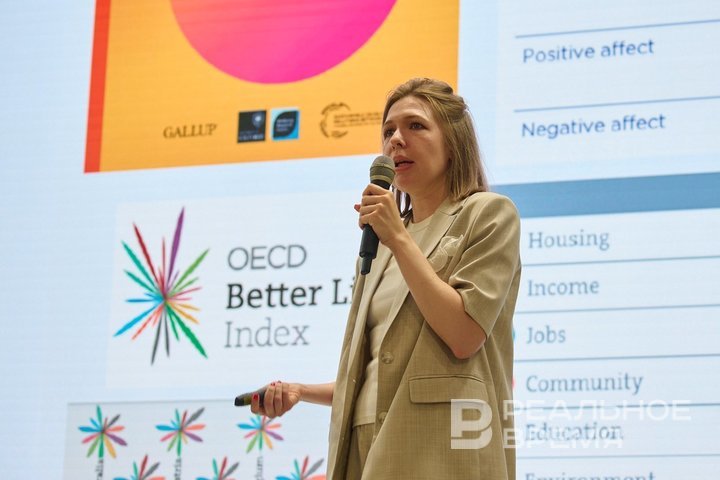‘Uzbekistan or France?’: MGIMO lecturers see a growth point in Asia
MGIMO experts named 4 versions of economic inequality between states

“The countries of Western Europe spent a significant part of their history in constant wars, and this allowed them to grow in technological development. However, their experience refutes the theory of classical economist Adam Smith, who argued that economic growth is possible only in peace," said the scientific director of the Oeconomicus Economic Club of MGIMO named after A.V. Makarenko, Alena Dolgova. She gave an open lecture at the National Library of the Republic of Tatarstan on why some countries achieve prosperity while others remain in poverty. There is no definite answer, but the MGIMO lecturer forecast that countries with young populations, such as Uzbekistan, will have the greatest potential for prosperity, while Europeans look at Japan with aging residents with fear.
The world itself has become 40 times richer
“The world is not as dramatic as it seems to us. There is a lot of progress in it," the scientific director of the Oeconomicus Economic Club of MGIMO named after A.V. Makarenko greeted the students and guests of the lecture with these words. Alena Dolgova. In confirmation, she gave some interesting facts about how far progress has come in modern society.
“Most of the world's population lives in countries with an average standard of living. Over the past 20 years, the proportion of the world's population living in poverty has almost halved," she said, based on data from an international study conducted by Hans Rosling.
The average life expectancy has increased to 70 years. 80% of the world's population has access to electricity. Modern youth began to study more than their peers at the beginning of the 20th century. For example, men spend an average of 10 years of their lives on education by the age of 30, and women by the same age — 9 years. In other words, gender differences in education are completely erased, and women are not inferior to men in professional skills.

The world itself has become 40 times richer. However, not everyone notices such dramatic changes. A survey in the audience showed that only a few guessed the correct answers, and in the world only 7% of respondents gave correct estimates. Society is still in thrall to misconceptions about the world, although in fact, not everything is as bad as it seems at first glance, Alena Dolgova concluded.
Why the rich get richer and the poor get poorer
Despite a huge breakthrough in the quality of life, there is still economic inequality between states in the modern world. Human incomes have increased 20 times, but the economies of the countries are getting richer unevenly. Why do some states achieve prosperity while others get stuck in poverty? For example, super-rich people live mainly in the USA, Great Britain and China. An open lecture on this topic was held within the framework of the Global Talks project, which is implemented by the Academy of Youth Diplomacy with the support of the Ministry of Youth Affairs of the Republic of Tatarstan and MGIMO (MFA) of Russia. The invited speaker Alena Dolgova is also a practitioner. She acts as a consultant to the Government of Uzbekistan on the establishment of International Trade Centre in the country.
The difference in economic growth between countries began to manifest itself in the 19th century with the beginning of the technological revolution. Before that, technological breakthroughs resulted in population growth, but wealth did not grow. Women gave birth to several children, which aggravated their plight. Most of the world's population lived in poverty. “Human life is lonely, poor, hopeless, dull and short-lived," wrote Thomas Hobbes. Almost all countries of the world lived in poverty.
Four versions of the causes of economic inequality
But after the 19th century, differences in the economic and social development of different states began to manifest themselves clearly. The pace of economic growth began to determine the availability of technology, financial resources and human capital. The change in the economic model led to a demographic decline. The benefits of civilisation began to go not into population growth, but into the quality of life. At the same time, the differences in economic growth between the countries began to become catastrophic. Where the economy grew faster, people got richer faster. Why do discrepancies persist?

According to Alyona Dolgova, there are four versions of the causes of inequality. First, developed countries have established stable governance institutions and clear rules of the game: “It is important to develop competition, have a variety of sources of income and freedom of trade," the speaker said. Secondly, culture: “It eats strategy for breakfast," Dolgova noted, making it clear that the culture of communication builds trust.
Is it possible to change culture? Here she gave an example of how UN staff were taught to park cars according to the rules: “Consultants from developed countries did not break the rules, but from developing countries — they did. But when fines were introduced, they began to obey the general rules," Dolgova said. Thirdly, the differences may be due to a more advantageous geographical location of the country and the possession of technological sovereignty.
Whom war leads to impoverishment, and whom it enriches
What role does the state's foreign policy play in development? This question was asked by the students. “The question is what kind of foreign policy it is, what it is aimed at. If its focus is on expanding foreign economic relations and searching for trade partners, then, of course, this will contribute to capital accumulation," Alyona Dolgova replied. In her opinion, economic interests should be higher than political ones.
“How do protracted wars affect the economic development of countries?" the next question followed from the audience. “There are two positions. The first is Adam Smith, the author of the first books on economics, and he was the first to say: for economic growth to be sustainable, it is important that there be peace in the country. A state that is in armed conflict is experiencing difficulties. This is a theory. But if you look at the history of the development of the economy of Western Europe, then most of the history of its states was spent in constant war, and there is a theory that this allowed them to grow in technological development, since they were in constant competition with each other and wars contributed to their competitiveness compared to neighbouring countries," the lecturer replied.
However, it is not necessary to look for answers for long. As you know, after the Great Patriotic War, the German economy was erased from the world stage, and the USSR raised the heavy defence industry from scratch, which has a dual purpose. The US industry, which provided supplies of military equipment, was enriched.
Where the richest people on the planet live
Is there a connection between the level of development of democracy and economic growth? There is no standard of a democratic state in the world, if we mean by this access to resources and income for a wide range of residents, the speaker noted. At the same time, the example of China shows that a state with strict centralised government can be successful and rich, although without democratic institutions.

Speaking about the United States, she noted that initially there were no democratic institutions in the sense of accessibility of the judicial system and protection of property rights from monopoly, and economic growth emerged as a consensus. She forecast that states with young populations would have the greatest potential for prosperity.
“Uzbekistan or France? Uzbekistan, of course, because the average age of the population is 20-30 years old," she explained. “Central Asia is a region with high growth potential, privatisation is underway there now and it is important to maintain investor confidence.
Japan, with its aging population, is viewed with caution even in Europe. Can a single country become self-sufficient? “No, today the world is a space of global chains, so it is important to take what you can produce at the lowest cost," Alyona Dolgova replied. Let's add that the number of super-rich people in the world has doubled in 20 years. We are talking about those whose wealth exceeds $100 million. At the same time, most of the billionaires live in the USA, China and the UK.